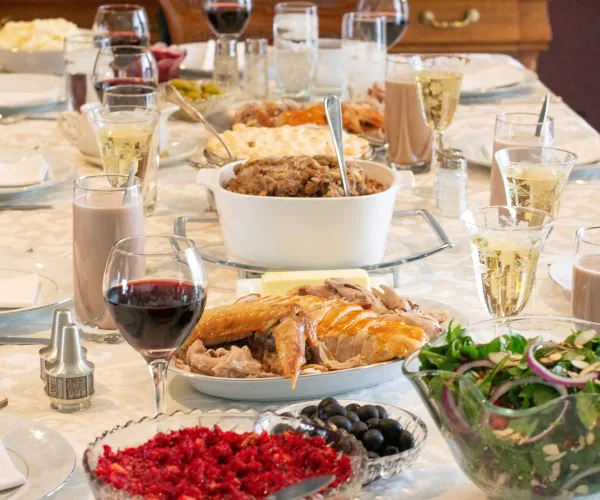Thanksgiving can be poisonous for pets

By Lynn Allison From Newsmax
A Knoxville, Tennessee family almost lost their golden retriever pup, Pippa, last Thanksgiving after she consumed rising bread dough. The dog became lethargic and landed in emergency care, where veterinarians fed her ice chips to stop the dough from rising in her stomach. Eventually, Pippa passed the dough on her own, avoiding surgery. But her experience serves as a warning for all of us this Thanksgiving to make sure our pets are safe.
According to TODAY, Dr. Renee Schmid, a board-certified veterinary toxicologist at Pet Poison Helpline, says calls to the 24/7 helpline always spike around the holidays, particularly food-centered ones like Thanksgiving. She noted that there are two main concerns with bread dough that contains yeast: the risk of gastric torsion, also called fatal bloat, and alcohol poisoning.
“What would be occurring sitting on your kitchen counter ends up occurring in your pet’s stomach,” she said. “That dough rises and causes a stretching of the stomach, or a distention. And then that yeast as it ferments produces ethanol, an alcohol. So, these animals can develop alcohol poisoning.”
Thankfully, Pippa’s owner sought medical help in time to successfully treat her condition.
Other toxic food for dogs include:
• Grapes and raisins. It is unsafe for dogs to consume grapes or raisins in any quantity because the fruit has been linked to acute kidney failure in animals. These two foods are 100% off limits for cats, too, says Michelle Burch, a doctor of veterinary medicine, from Safe Hounds Pet Insurance. Experts believe it may be the tartaric acid in grapes that can lead to toxicity and rapid kidney failure. Symptoms of vomiting, increased drinking, and painful belly may occur within 24 hours of ingestion.
• Onions. Even a small amount of onions is severely toxic for dogs, say experts. Onion is considered dangerous for dogs in all forms: raw, cooked, fried, or powdered. All parts of the allium family including leeks, chives, garlic, and shallots are highly toxic. Never give a cat anything that has been cooked with garlic and onions as these foods can trigger hemolytic anemia, says Burch.
• Animal bones. According to the ASPCA , cooked animal bones tend to splinter, so there is a risk for esophageal damage if ingested by either dogs or cats. If this does happen, increase the fiber in the pet’s diet and monitor the passage of bones through the gastrointestinal tract.
• Bouillon. Many people use bouillon cubes when making stocks, gravy, and other holiday food items. Bouillon contains a very high amount of sodium that can trigger hypernatremia, an elevated number of sodium ions in the blood, which can lead to fatal cerebral edema. Intravenous fluid therapy, oral water and water enemas are all helpful in bringing down the sodium level.
• Baked goods. Pumpkin pie with whipped cream or apple pie with ice cream are classic desserts served at Thanksgiving tables. But if a pet consumes these treats, they could develop pancreatitis, says the ASPCA.
• Chocolate, coffee, and caffeine. These products contain substances called methylxanthines, which are found in cacao seeds, the fruit of the plant used to make coffee, and in the nuts of an extract used in some sodas. When ingested by pets, methylxanthines can cause vomiting and diarrhea, panting, excessive thirst and urination, hyperactivity, abnormal heart rhythm, tremors, seizures, and even death. Experts say that dark chocolate is more dangerous than milk chocolate.
• Xylitol. This sweetener is used in many products, including gum, candy, baked goods, and toothpaste. Consuming xylitol can cause insulin release in most species, which can lead to liver failure. Symptoms include vomiting, lethargy and loss of coordination and could progress into seizures.
The ASPCA Animal Poison Control Center phone number is 888-426-4435. For the Pet Poison Helpline, call 855-764-7661.
© 2022 NewsmaxHealth. All rights reserved.
For more on this story go to: NEWSMAX





